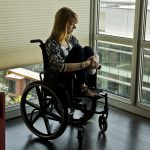
Posted on April 20, 2020
Like a lot of parents, suddenly I’ve found myself simultaneously a full-time work-from-home and stay-at-home parent due to new Coronavirus restrictions that have shut down my state and are requiring all non-essential employees to work from home. As the two-week timeline was extended to a month and then two months, my thoughts went from “We can do this!” to “Oh boy” to “How are we ever going to get through this?”
One thing quickly became clear: for my own sanity I needed to settle into this new normal and figure out how my family and I would make these circumstances work (and hopefully do so with a sense of happiness). My first thought was to intentionally set up positive behavior supports for my family (which includes my 5-year-old son, Thomas, and my husband). My training is in school counseling and I’m currently employed as a project coach with the Delaware Positive Behavior Support Project at the University of Delaware’s Center for Disabilities Studies. So, I should have all the tools needed to make this work, right?

Posted on January 10, 2019
You probably didn’t see them. Too few people did. News stories about thousands of people with disabilities facing life-or-death situations.
One reported that more than 10,000 people died waiting to hear the result of their Social Security Disability Insurance appeal in 2017. The other revealed that Delawareans with disabilities who rely on Supplemental Security Income can’t afford the rent on an average one-bedroom apartment.
Unfortunately, the stories appeared during the holiday rush. Bad timing. But you also likely didn’t see them because too few press outlets chose to give the topics the time of day. Then as now, the press was more interested in devoting space daily to Democrats taking control of the House, the government shutdown and the volatile stock market – important stories, surely, stories the media considers mainstream. Yet they also gave space, and plenty of it, to stories involving Meghan Markle and Lady Gaga, the weather, and, dare I say it and lose local readers of this post, the Eagles’ chances of making the playoffs.

Posted on March 6, 2018
It’s 2018. I have to remind myself each time someone I know uses the R word. They – no – society should know better than to use such degrading, insensitive language. My jaw shouldn’t have to drop because my professor used the R word in class, even if he did apologize and admit he was adjusting to the “new” term, intellectual disability. I shouldn’t be disappointed when a classmate uses the word to describe the “stupidity” of her significant other.

Posted on November 20, 2017
People with disabilities are often treated unfairly in the workplace. To make matters worse, people with disabilities who come from a minority racial background are at even more of a disadvantage. As a black man with autism, I fit into that category. I believe a person, regardless of disability or the color of his skin, should be evaluated on the content of his character and on the quality of his work as an employee. However, the stigma still exists that

Posted on October 20, 2017
Let’s begin with SWEET:
“Have a good day, sir!” Ian Snitch said enthusiastically to a guest exiting the Courtyard by Marriot – a courteous and attentive act that Ian executed even before his supervisor, a front-desk specialist, had gotten the chance.
It would be just one of many things Ian said and did on Disability Mentoring Day (DMD) that impressed and amazed me. A first-year student in the University of Delaware’s Career and Life Studies Certificate (CLSC) program, Ian, along
This entry was posted in Center for Disability Studies, community living, developmental disabilities, diversity, Education, employment, inclusion, independent living, intellectual Disabilities, people with disabilities, Uncategorized, University of Delaware and tagged Courtyard by Marriott, Disability Mentoring Day, Office of Disability Employment Policy, Senator Chris Coons, University of Delaware.






